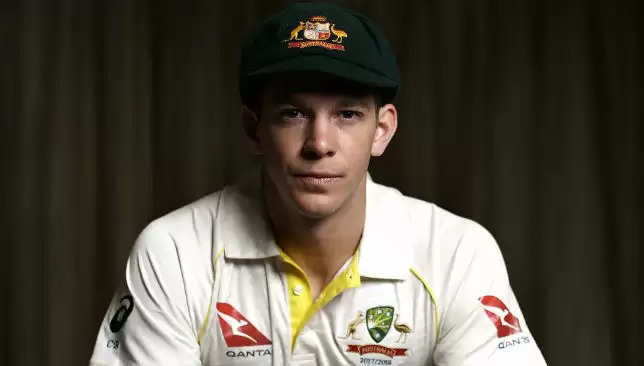Tim Paine under the scanner – the inimitable legacy of the accidental captain

The journey of Tim Paine from one of obscurity, marking an appearance every now and then but largely being forgotten in the general scheme of things to becoming the leader of the tectonic cultural shift in the dressing room and managing over one of the darkest periods in Australian cricket in this generation has been nothing short of astounding.
During the third Test match against South Africa in 2018, Cameron Bancroft was caught trying to rough up one side of the ball using a sandpaper. What happened next was unprecedented and rocked the world of cricket in Australia. The next morning, Steven Smith and his deputy David Warner were held accountable for the same and all three faced lengthy expulsions from the professional sport for the now infamous Sandpaper Gate scandal.

After the final Test in South Africa, coach Darren Lehmann turned up at the press conference. As he removed his glasses, drops of tears fell as he ended up resigning from his role. Australian cricket team was staring into the void. Heartbreaks and tears ran rampant everywhere as players and staff couldn’t believe what had happened. Their entire world had been turned upside down.
ALSO READ: Cummins Believes That Australia Are Better Equipped To Face India Compared To The Last Time
Following that was the constant media scrutiny and the public outrage. Back home in Australia, everyone, from the Prime Minister to the regular fan had turned their backs on the side. A wider dissection and peering into the dressing room culture began over the next few months as an angry Australia fell out of love of with its cricket team.
Headlines were so engrossed with analyzing every little detail of the scandal and on the futures of Warner and Smith that the unanimous appointment of Tim Paine as the captain despite having just 12 international Test appearances to his name missed the radar. But then, like most things, that didn’t take long to change either. Dubbed the ‘Accidental Captain’, bewilderment and surprise led to unparalleled scrutiny.
Tim Paine, however, had work to do. He had no time to relish the biggest moment of his life and career. A few months ago, the Tasmanian wasn’t even a regular in his state team. A year ago, he was thinking of giving up on the sport altogether. And now he was the 46th captain of the Australian National Cricket Team.
The concurrent series was lost. South Africa put Australia out of its misery and registered a 3-1 series victory at home. Paine, however asked his countrymen to look at the positives. “It’s an exciting time, we are going to have a new coach and a new brand and culture,” Paine told reporters after the 492-run fourth Test loss on Tuesday, the fourth largest defeat in terms of runs in test history.
A cultural change was absolutely necessary, highlighted Paine in that same press conference. “We have to listen,” Paine said. “We have potentially had our heads in the sand over the last 12 months that if we continue to win we can act and behave how we like and the Australian public will be OK with that. We have found out in the last month that the Australian public don’t like the way we go about it, so it is pretty simple, we have to improve our behaviour.”
“We have to find the fine line between being really respectful of the opposition and also being at a level that is really competitive, as you should be in Test cricket.”

Fronting up to critics was perhaps a bigger chore for Tim Paine than facing the wrath of the media.
The reception back home for the newly anointed skipper was less than warm. He wasn’t cut out for the role, Shane Warne announced to the world as he thought Paine wouldn’t last long as captain. Former bowler Geoff Lawson also suggested that he stand down after that Australian summer. And, to be honest who could’ve blamed them for thinking that? Who was Tim Paine? As harsh as it may sound, the then 34-year old was a virtual nobody who was picked from obscurity and thrust into the deep water, tasked with the biggest transition period in Australia’s recent cricket history.
Beginning his career as the youngest contracted Australian cricketer when he received a rookie contract with Tasmania at the age of 16, Tim Paine was the face of incredible promise. The blonde haired Tasmanian wonderkid was earmarked as the successor of keeper Brad Haddin and even filled in for Haddin in the 2009 series against England, making his debut and scoring a century in the sixth match of the series. Another injury to Haddin paved the way for Tim’s debut in international Test cricket alongside his future captain Steve Smith.
However, that trajectory did not last long as everything came crumbling in that one moment and in that Dirk Nannes delivery during the T20 exhibition game that broke his finger. The thunderbolt struck Tim hard. He had to go through multiple surgeries and various forms of treatment with pins and plates put into him but the relapses wouldn’t stop. The infections kept returning and kept haunting his attempts to get back to state cricket. Between 2011-2017, he was restricted to the sidelines and virtually disappeared into thin air.
As shocking as it might sound, Paine actually came very close to hanging up his gloves and taking up a full-time job with sports goods manufacturer Kookaburra. Former captain Ricky Ponting and the 2017-18 coach of Tasmania, Adam Griffith talked Tim out of it. Australia owes a debt of gratitude to both of those individuals. Who else could it have turned to in that moment to weather the storm and get them out of the crisis with nothing but a calming smile on his face.
The task that lay ahead of the Tasmanian was greater than anything his predecessors had to face before him- restoring the pride in Australian cricket. Thankfully, Paine and Lehmann’s successor, Justin Langer were cut out of the same cloth and the job of rebuilding Australia’s cricket culture couldn’t have gone to anyone better.
During the test series against Pakistan, the first since that March in South Africa, Tim, still the caretaker captain thought to be many as interim until Steve Smith was ready to take up the helms again, lay his ideals and started getting the team to believe in them with the utmost conviction.
“We want to build a culture that makes people want to be better and produce not only better cricketers but better people,” he told Fairfax Media.
“If we can do that, that’s the sort of environment people want to be involved in and that culture spreads really quickly through the team rather than having to try and sell your culture all the time – just set that culture, live that culture, and guys that want to be involved will carry it through.”
The Tasmanian and Langer were quick to identify that Australia couldn’t go about their chest-thumping, abuse and aggression-filled arrogance on the pitch anymore. So, instead they turned their focus on bringing the best out of the individuals who would go to war with Paine if required, but would always know when to draw the line.
‘Temporary captain’, every now and then someone would continually whisper into his ears during much of the early days of his reign. Subjected to constant sledging and scrutiny over his returns with the bat and performance behind the stumps, the road was long and hard, much like his career. Paine, however didn’t flinch. This was the biggest opportunity in his career. He tried giving up on the sport he loved was once before, he wasn’t going to take that decision now.
Australia did not know what to do when, led by Kohli’s verbal and physical aggression, they were smashed to smithereens by Team India. Paine turned to Langer and the answer arrived in a mix of humour and defiance. Banter, not abuse was the line coach Justin Langer insisted on. The nation took notice and started seeing something they admired, they had found the wind of change they needed to fall in love with the national side once again.
“Murali, I know he’s your captain but you can’t seriously like him as a bloke”
Australia captain Tim Paine gets the last laugh with an absolute zinger against @imVkohli
pic.twitter.com/6E8bASbFQT
— Telegraph Sport (@telegraph_sport) December 17, 2018
And the results started following soon. Since that Perth Test, when he stood up to Virat Kohli, the tide of fortune changed, both on and off the field. His date with destiny arrived in England. Paine’s side managed to retain the urn in the greatest Test series in the world – something the likes of even Ricky Ponting and Michael Clarke couldn’t accomplish.
Australia were left reeling after that Ben Stokes masterclass at Headingley, but Paine’s moment was yet to arrive, and arrive it did in Manchester. That was his most influential game as captain of Australia till date as he put up pivotal match knocks and was immaculate behind the stumps and precise in his decision-making.
“Paine’s undemonstrative demeanour and capable leadership has not only seen Australia emerge from the rubble of Cape Town to become a top-level team, it’s also resulted in their reputation rising from the depths to the heights,” wrote the legendary Ian Chappell. “Paine has overseen this resurgence with a quiet but steely resolve, a thoughtful approach and a splash of humour that helps relieve Test cricket’s tensions.”
While he may not have the illustrious career of his predecessors, Tim Paine has ended up accomplished what nobody had done before- overseeing the cultural transition in Australia’s age-old cricketing history. The accidental captain became a hero when he helped the team retain the Ashes after a gruelling series in England. In the recent ICC Test rankings, Tim Paine’s Australia occupied the number 1 spot.

Retaining the Ashes after the series in England was a huge high for Tim Paine
The success hasn’t changed him one bit however. He still considers himself extremely fortunate to be waking up as the captain of his country. he is just happy to be there and playing the game that he loves with his mates.
“I am just happy to be a part of it. I could have been working at Kookaburra, so this isn’t too bad.” Paine said.
In the recent Amazon Prime series The Test that covers the side from the time Paine was appointed as skipper until the Ashes, The Australian’s cricket writer Gideon Haigh probably describes the impact of Paine’s tenure best. “We like them more than we used to and I think that’s more important than being proud of them.”

